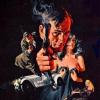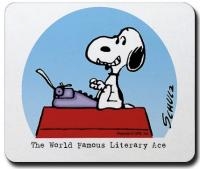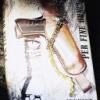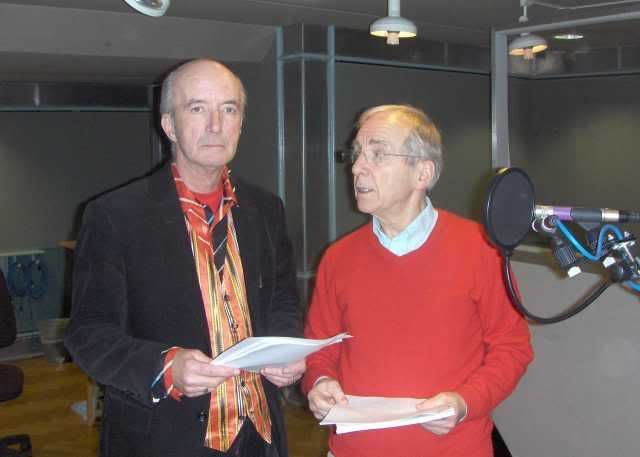of SHERLOCK HOLMES from Drew McWeeny a.k.a. "Moriarty" back when he wrote for Ain't It Cool. It's a thoughtful and extremely positive review. He clearly saw the movie that I thought Ritchie was making all along and I am doubly excited to see it now:
One of the most interesting things about reading "Sherlock Holmes" reviews so far is realizing just how little most people know about the actual Sir Arthur Conan Doyle version of the character, and just how completely the Hollywood interpretation of that character has become the "real one" for the majority.
When Harry Knowles branded me with the nickname "Moriarty" all those years ago, it was because I was a snide smartass who sent him e-mails discrediting this bit of information or that bit of information. I wasn't even trying to become a contributor to his site... I just wanted to take my shots at him and then move on. Harry somehow saw past my original snark, though, and invited me further and further into the fabric of AICN, turning me from a jerk with an opinion into... well... a jerk with a job, I guess. Over the years, people have assumed that I picked the name because I was a huge fan of the character, but that's not the case. It was actually the other way around.
One side-effect of being named "Moriarty" is that I've been sent enough Sherlock Holmes material over the years to start a museum. And over the years, I've read the full Arthur Conan Doyle several times, front to back. It's a brisk read each time, and each time, I'm struck by just how modern a creation he is, even viewed from a 21st century perspective. There's a reason people find themselves compulsively hooked on "House," and it's little surprise you can build an entire empire on the kicks afforded by a "CSI." Both have their origins in Sherlock Holmes and his ongoing adventures with his trusted friend, Dr. John Watson. These two characters have been played on film more times by more people than any other literary creations, and the basic formula has been bent and twisted so many times, in so many ways, that most audiences have no idea what the "real" Sherlock Holmes is like. They base their knowledge of the character on a few surface details, and they've been quite vocal about how upset they are by the way Guy Ritchie and Joel Silver and Robert Downey Jr. are "ruining" the character.
Only... they're not.
In fact, I'd say "Sherlock Holmes" represents not a radical reinterpretation of the character, but instead a nearly revolutionary return to the genuine pulp roots of what Doyle originally envisioned. No matter how beloved the stories have become, and no matter how much technical skill Doyle brought to the table (quite a bit, for the record), his stories were pulp adventure that followed a rigorous formula. It's little wonder they have been adapted or reinterpreted for film so many times, since the rules were so clearly laid out over the course of the stories he wrote, and the archetypes so clearly defined. What's amazing is how much they changed in what are now thought of as the "classic" film versions, while here, they've reverted to the text as much as possible and suddenly it seems to the general public like they've reinvented Holmes. I don't think most audiences will care, though, because what Guy Ritchie has done, working with a small army of screenwriters and a team of dedicated producers, is tap into the pure pulp adventure spirit of the stories in a way that should leave audiences worn out from being entertained.
The first thing they got absolutely right was the casting of Robert Downey Jr. and Jude Law. And it's not one or the other, but the two of them together. Downey is able to bring all of his twitchy brainy energy to the role, and Law seems to have finally found the perfect showcase for the particular dry charm that Hollywood has so completely failed to utilize. Their chemistry is dead right, and they seem to take enormous pleasure from the back-and-forth between them. This is one of the original buddy acts, and the dynamic here is exactly what it should be, played at a moment where that dynamic is put to a genuine test. Sherlock is a brilliant man, with a mind that needs a puzzle to engage it, or, preferably, dozens of puzzles at once. When he's got something to do, Sherlock is alive, acute, practically bristling with energy. When he's got nothing to occupy himself, Sherlock turns inward, and introspection is not the healthiest of pursuits for him. He slips into a lethargy that borders on self-destruction. Watson serves as the perfect companion for Holmes in both modes. When Holmes is on a case and up, Watson is the ideal sounding board, a smart but rigid man whose way of seeing things gives Holmes something to bounce off of, and whose constant queries force Holmes to be able to explain his seemingly-magic leaps of logic. When Holmes is in depressive mode, Watson is the one person who is able to steer Holmes through with minimal damage to himself or others.
So when Watson meets Mary (Kelly Riley), the woman he intends to marry, it threatens to rip a hole in the perfect life that Holmes has created for himself. This was one of the things Doyle did in the series as it wore on, and the decision to start this new incarnation of the story here is an interesting one. In some ways, this feels like a sequel where we never saw part one, and that's going to possibly throw some people. As much as critics repeatedly say they're tired of origin stories, for many audiences, this will be their introduction to the world of Holmes, so the easiest way to make sure everyone follows everything would have been to go back to the moment where a freshly-discharged Watson returns home from military service and ends up moving into a flat with Holmes. By starting it where they do, these filmmakers take the relationship between Holmes and Watson as a given, and the film is all about the obstacles thrown in the path of that partnership. One is a mystery, one is a marriage, and another is a woman with an agenda. The way these three threads play out is witty and nimble, and the script credited to Michael Robert Johnson, Anthony Peckham, and Simon Kinberg (from a story by Johnson and producer Lionel Wigram) keeps all those balls in the air with little effort. It's a busy film, but it's not a confusing film, and a big part of that is because of Guy Ritchie.
I enjoyed Ritchie's first few films, "Lock Stock & Two Smoking Barrels" and "Snatch," but I wouldn't argue that either one is a great film. They are slick, scrappy little movies that have a huge energy to them, and that's what made them charming. But since then, Ritchie has been adrift. I would argue that "Swept Away" and "Revolver" are both wretched films, movies I would never want to revisit, and even if "RockNRolla" was more fun, it still seemed like a narrative step backwards, a retreat to familiar ground. Overall, Ritchie's always seemed like a stylist in search of a subject, and with Sherlock Holmes, it's finally clicked into place. Ritchie's obsessions as a director include playing with time in order to explain that what you think you saw isn't actually what you saw, the way perception plays tricks on us. That's exactly right for a movie in which Sherlock's deductive skills leapfrog him past everyone else in the room, forcing him to back up and explain how he reached a conclusion. Instead of just sitting in a drawing room and listening to Sherlock explain everything in long monologues of exposition, Ritchie walks us through things visually, and it keeps the film pulsing forward with the same edgy energy that we see in the action scenes.
Oh, yes... the action scenes. This is probably the most controversial choice made with this new run at the character, and it shouldn't be. After all, Conan Doyle himself wrote the ultimate confrontation between the genius of Holmes and the genius of his arch-enemy Moriarty as a fistfight above a waterfall. Doyle has always been clear about the fact that Holmes was trained in Brazilian martial arts and the rules of boxing, both Queensbury and street, which makes sense. Why wouldn't a genius who frequently puts himself in harm's way learn how to handle himself physically? And in particular, why wouldn't he learn martial arts, where how you think is as important as how strong you are? There's an early sequence where Sherlock, despondent over a disastrous dinner with Watson and his fiancee, goes to a boxing match to distract himself. He toys with his much larger opponent in the ring for a while, until he gets distracted for a moment, then laid flat. When he tries to walk away, the man spits on the back of Sherlock's head, and Ritchie freezes the action, slows everything down, and then Holmes thinks his way through the dismantling of the man. How he's going to disorient him, then cause him such staggering pain that he can't fight back, and then put him down for good. When Ritchie returns to real-time, Holmes does exactly what he thought about, but in real-time, and sure enough, the guy goes down. This happens a few times in the film, and each time, there are particular things Holmes needs to accomplish, and Ritchie shows us how a smart man who's not a superhero might pull it off. That's what Holmes brings to the action scenes that's different than the norm, and it really pays off.
Mark Strong continues his march toward world domination with another great, seemingly effortless performance here as Lord Blackwood, who comes across as a well-heeled Alistair Crowley, a man acutely aware of the value of a supernatural threat. His labrynthine plot is a little bit Guy Fawkes, a little bit Damien Thorn, and Strong makes himself a menace in every scene without ever once stopping to twirl the mustache with some obvious choice. That's why I love Strong. Yes, he's playing somewhat routine bad-guy roles like this or Frank in "Kick- ," but what he does with them is the exact opposite of "obvious." He's a hell of a good actor, and he elevates everything he does these days.
," but what he does with them is the exact opposite of "obvious." He's a hell of a good actor, and he elevates everything he does these days.
Rachel McAdams costars as Irene Adler, whose one appearance in the Doyle stories saw her besting Holmes in a battle of the wits, and she makes the perfect foil for him in the film. Sherlock's not drawn to women for surface reasons, but the idea of a woman whose beauty is just as provocative as her brain? Catnip. She knows it, too, and plays him like a violin from the moment she arrives in the movie. How she relates to the primary mystery involving Lord Blackwood, the Satan-worshipping royal whose death by hanging kicks off the film is something that isn't clear at first, but gradually, it's revealed that she's working for someone, and that what she wants and what her employer wants may not be the same thing at all. It's smart to make this her storyline because it sets up a reason to bring her back in future films organically. It's obvious that her employer is the main villain of the franchise, but by keeping him in the shadows in this film, Ritchie and company have given themselves somewhere to go.
And go and go and go, if the energy of this one is anything to judge by. The film starts in the middle of a chase sequence at the end of a case and then keeps ramping up with each new sequence, eventually building a stand-off atop a bridge under construction. Ritchie and his production team, including cinematographer Philippe Rousselot and production designer Sarah Greenwood, have conjured up a London that is devoid of any romantic nostalgia. It's amazing how few filmmakers have ever attempted to bring to life the grimy, disgusting, nigh-uninhabitable hellscape that was London at the end of the 1800s. There's a fantastic novel by Dan Simmons called Drood, about the relationship between Charles Dickens and Wilkie Collins, that evokes every sight and scent in nauseating detail, but filmmakers always tend to shy away from those things. Ritchie does his best, though, to get it right and it adds to the eccentric character of the film just as much as the bombastic and exhilarating score by Hans Zimmer, one of the best he's ever written. It's out there, filled with percussive noise and bizarre instrumentation, but it works well, complementing the film in any number of ways.
If you want to see the old Basil Rathbone version of Holmes, or if your loyalty lies exclusively with the Jeremy Brett interpretation, or if you want a genuine reinvention/subversion like "Murder by Decree" or "The Seven Per-cent Solution," I can understand that, and I would warn you to stay away from this one. If, on the other hand, it's the character you love and you'd like to see someone try to reclaim it from one overbearing interpretation, a la what happened with Daniel Craig and "Casino Royale," then I'd advise you to check out "Sherlock Holmes" as soon as it opens. It is an uncommonly spry thriller, both mentally and physically, and positively drunk on the work of Arthur Conan Doyle. It may not be a Holmes for everyone, but Holmes it is. Undeniably.








